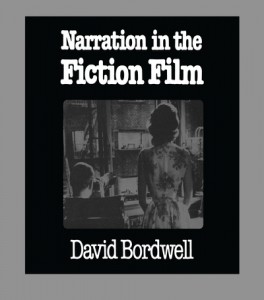Narration in the Fiction Film


Moyenne des votes : ![]()
| 0 | vote | |
| 0 | vote | |
| 0 | vote | |
| 0 | vote |
Votre vote : -
Description de l'ouvrage:
Most films tell tales, but what does that involve? How do motion pictures tease us into building what we all agree to call stories? In this study, David Bordwell offers the first comprehensive account of how movies use fundamental principles of narrative representation, unique features of the film medium, and diverse storytelling patterns to construct their fictional narratives. The result is a pioneering, far reaching work which will change the way we perceive narrative film and which every serious film scholar, student or fan will welcome.
Bordwell begins his study with an overview of general approaches to narration. Drawing on the insights of certain theories- in particular Russian formalist aesthetic theory and cognitive psychology for its notion of how the viewer contributes to the process of narrative comprehension- he formulates a new concept of narration that is uniquely applicable to fictional cinema. Films, Bordwell argues, are patterned systems that prompt spectators versed in narrative conventions to construct a story. Since cinema is a medium involving both time and place, he considers how these factors affect the concrete process of film narration and help shape the spectators’ story comprehension.
If the conventions of story making very from medium to medium, they also vary historically. Dominant modes of film narration, Bordwell suggests have furnished tacit conventions for film makers and audiences at different periods. Characterising four of these modes as classical Hollywood cinema, the European ‘art cinema’, the Soviet historical materialist film and parametric narration, he examines the history and specific strategies of each.
Ultimately, however, Bordwell offers more than abstract theory. Demonstrating how his concept of narration can aid in the critical analysis of particular films and film makers, he provides fresh discussions of such movies as ‘His Girl Friday’, ‘The Big Sleep’, ‘Rear Window’ and ‘La Guerre est Finie’. In director Jean-Luc Goddard, Bordwell finds particularly telling reference point; the Frenchman's films derive their particular difficulty and charm, he argued, by parodying, mixing and subverting those narrative conventions which audiences have learnt to trust.
À propos de l'auteur :
David Bordwell is Professor of Communication Arts at the University of Wisconsin-Madison.
Revue de Presse:
'This book is of crucial importance to film specialists. I cannot think that any film teacher/scholar would miss reading this work.' - Don Fredricksen, Cornell University '
Narration in the Fiction Film is an excellent study of issues in the analysis of narrative and a major contribution to work on analysing film narratives. His studies of particular films in this respect are exemplery and illuminating.' - Elizabeth Cowie, University of Kent
Voir le site internet de l'éditeur Routledge
> Du même auteur :
Perplexing Plots (2023)
Popular Storytelling and the Poetics of Murder
Film History (2021)
An Introduction
de Kristin Thompson, David Bordwell et Jeff Smith
Sujet : History of Cinema
Reinventing Hollywood (2017)
How 1940s Filmmakers Changed Movie Storytelling
Sujet : History of Cinema
The Classical Hollywood Cinema (2015)
Film Style and Mode of Production to 1960
Minding Movies (2011)
Observations on the Art, Craft, and Business of Filmmaking
de David Bordwell et Kristin Thompson
Sujet : General
> Sur un thème proche :
Cinema as a Worldbuilding Machine in the Digital Era (2022)
Essay on Multiverse Films and TV Series
Sujet : Theory